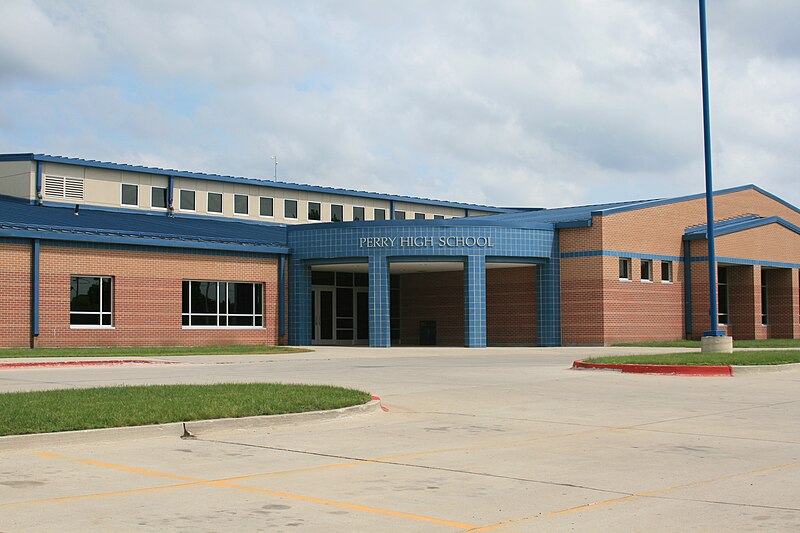Randy Evans is executive director of the Iowa Freedom of Information Council and can be reached at DMRevans2810@gmail.com.
I have fielded a bunch of emails, text messages and phone calls in the days since the school shooting in Winder, Georgia.
Each one is from Perry, Iowa. Each one had the same question for me and the Iowa Freedom of Information Council. Each one came from a parent, teacher or other concerned person asking, why isn’t the public allowed to read the official findings by state agents about the shooting at Perry High School and Middle School last January 4?
High School Principal Dan Marburger and Ahmir Jolliff, an 11-year-old sixth-grader, died from their gunshot wounds. Two school employees and five students were wounded but survived. The shooter, Dylan Butler, 17, took his own life before police could reach him.
The school shooting in Perry was the first in the United States in 2024. Eight months later, Perry residents received a painful reminder of that awful morning, this time when news flashed across the nation of another school shooting. A 14-year-old youth is charged with killing two students and two teachers at the high school in Georgia. His father is charged with providing the gun the boy used.
In the months since the Perry tragedy, the community has waited patiently for law officers to complete their investigation and find the answers the countless questions law officers and the public have. The state’s Division of Criminal Investigation has finished its work and given Dallas County Attorney Jeannine Ritchie a report detailing investigators’ findings.
There have been many rumors surrounding the Perry shootings and the shooter. But there have been many more questions.
Where did the shooter get the shotgun and pistol he used? Did his family know he had the guns? Was he bullied by classmates? Were there any signs he was struggling emotionally? Did his parents have any inkling he had been thinking about mass killings? Were there any encounters that triggered his decision to take the guns to school on the first day after the winter holiday break? How did he get the guns into the school without detection? What did the school principal do in the school cafeteria that morning in his futile attempt to calm Butler?
These questions and many others do not grow out of some ghoulish curiosity. This is not the same mindset that makes “true crime” television programs so popular. The people in Perry and across Iowa want to better understand what occurred at the school and why the events happened.
There is a problem, however: It is difficult for concerned citizens to learn without access to accurate, authoritative information—information the DCI report contains.
But Ritchie said she does not intend to release the DCI report. She would not answer reporters’ questions, other than to say she is basing her decision on a section of Iowa’s open records law that exempts peace officers’ investigative documents from disclosure.
Ritchie is correct in that respect. The law allows the DCI report to be kept confidential. But Ritchie fails to acknowledge another key provision in the public records law, one that gives her, as the lawful custodian of the DCI report, the authority to release it to the public.
It is inconceivable this discussion is occurring. School shootings are occurring with troubling frequency and people are worried sick about the safety of children in schools. The intense public interest in the Perry case is not going to be satisfied by the local prosecutor simply saying, “The report is confidential. End of discussion.”
Without knowing the conclusions the DCI drew from hundreds of interviews, from its analysis of social media posts and from investigators’ study of the two guns the teenager took to the school, Perry parents, teachers and community leaders are no closer to getting their questions answered than they were in those frightening hours after the first shots.
If government officials are not going to provide authoritative, detailed findings and conclusions about a tragedy like the one in Perry, then it is time for the Iowa legislature to step in and change the law to bring needed common sense to the balance between openness and secrecy in police matters.
In the meantime, the county attorney needs to explain to the people of Dallas County why she is keeping them in the dark. It’s their kids. It’s their schools. They are the ones who are still grieving.
Top photo of Perry High School is by Richc80, available via Wikimedia Commons.


2 Comments
I would like to know...
…whether this kind of investigative-document secrecy in Iowa is increasing. And I would also like to at least see brief public explanations when investigation results are kept secret. Essentially saying “I’m keeping it secret because I want to and the law says I can” does not work well.
PrairieFan Thu 12 Sep 4:24 PM
It’s worse than what Randy writes
My school district refuses to share with parents what measures will be taken during a shooting. Kids receive little to no drill. Only teachers are told, so that prospective shooters are left in the black. This is just another way for schools to tell the parents and the kids that only schools know what’s good for them.
Karl M Fri 13 Sep 6:02 AM